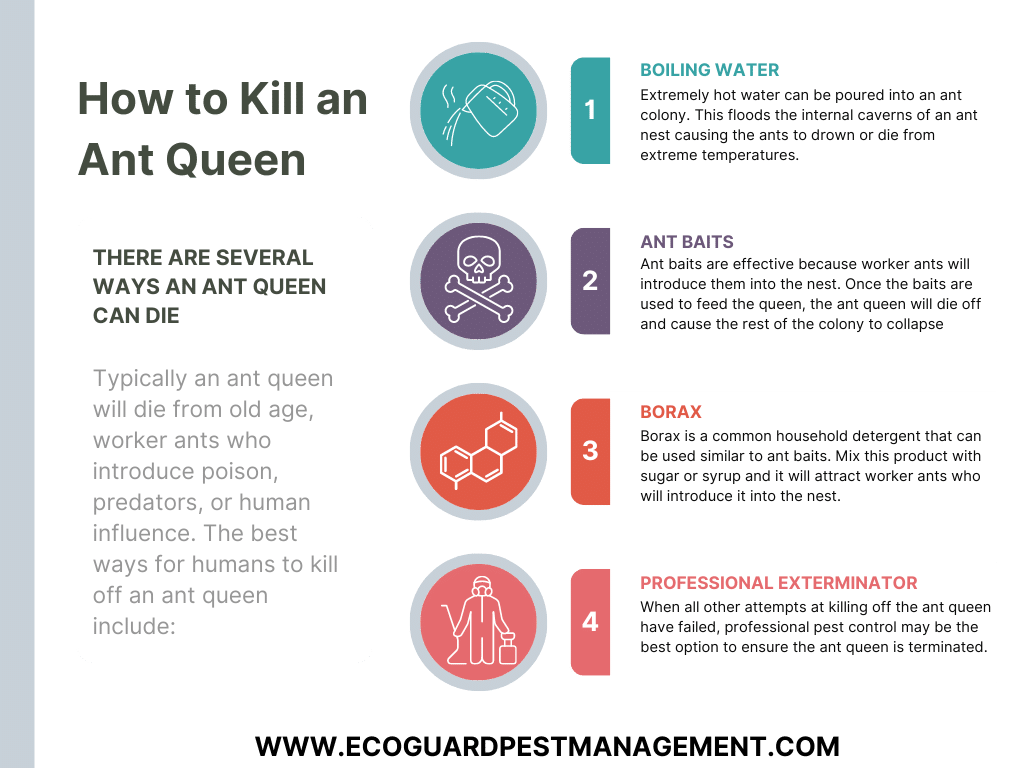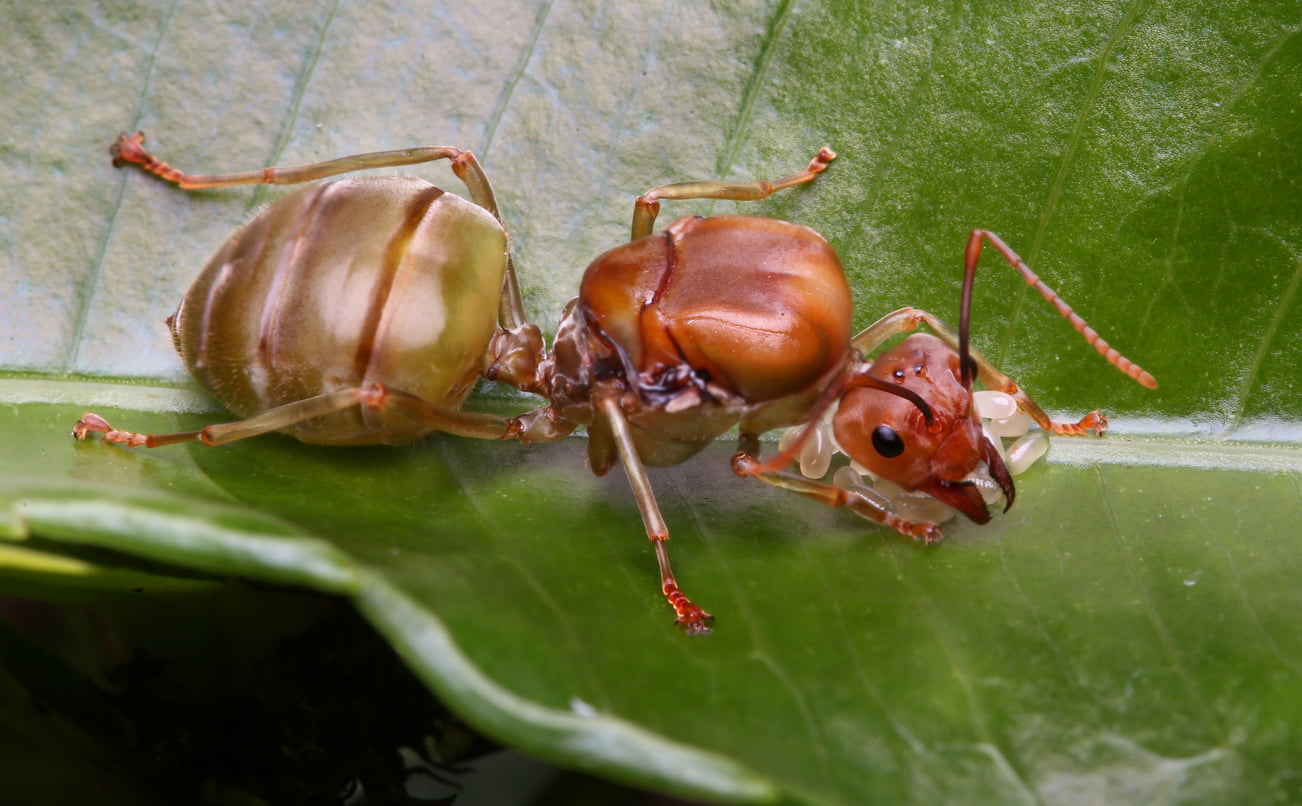The death of an ant queen leads to the cessation of egg production and eventual colony decline. When an ant queen dies, the colony can survive for months without her.
The workers continue to collect food, and there won’t be any changes to their behavior. However, without a queen, there will be no new offspring, eventually leading to a decline in the colony’s population. Unlike honey bees that can raise a new queen, worker ants cannot take on this role, nor will they accept one of their sisters as a new queen.
The queen’s death can lead to the eventual demise of the colony, as the loss of egg-laying ability impacts the colony’s future.

Credit: drdeathpestcontrol.com
Impact Of Ant Queen’s Death
The death of an ant queen has significant consequences for the ant colony. It disrupts the delicate balance within the colony and affects various aspects of its survival. Let’s explore the impact of the ant queen’s death in more detail.
Ant Colony Survival
Ant colonies rely heavily on the presence of a queen for survival. The queen is responsible for reproducing and maintaining the population of the colony. Without a queen, the colony’s ability to grow and expand is severely hindered.
Worker ants, who play a crucial role in the functioning of the colony, do not possess the ability to reproduce. They rely on the queen to lay eggs and continue the population cycle. Without a queen, the colony gradually loses its ability to replace aging or deceased worker ants, leading to a decline in the colony’s overall strength and numbers.
Egg Production Discontinuation
One of the most immediate and noticeable impacts of the ant queen’s death is the cessation of egg production. The queen is solely responsible for laying eggs, which ensures the colony’s continuity and growth. When the queen dies, the colony loses its source of new ants, causing a halt in the reproduction process.
This disruption in egg production has long-term consequences. The colony cannot replenish its worker population, and without new workers, the efficiency of tasks such as foraging, nest maintenance, and defense diminishes over time.
Without eggs being laid by the queen, the colony’s ability to adapt, evolve, and respond to changing environmental conditions is compromised. This lack of genetic diversity and adaptability can make the colony vulnerable to various threats and challenges.
Overall Impact
In summary, the death of an ant queen has a significant impact on the survival and functioning of the ant colony. The colony may attempt to replace the queen, but in many cases, this is unsuccessful.
Without a queen, the colony’s population gradually declines, and its ability to reproduce and maintain its workforce is compromised. The loss of egg production disrupts the colony’s ability to adapt and respond to changes, making it more vulnerable to threats.
Ultimately, the death of an ant queen marks a turning point for the colony, leading to a decline in its overall vitality and survival prospects.
Replacement Of Queen Ant
When the queen ant dies, it can have significant consequences for the colony. The replacement of the queen ant is essential for the survival and functionality of the colony. In most single queen species, the inability of worker ants to take over the role of the queen makes the situation crucial. Understanding how the replacement of queen ant occurs sheds light on the intricate dynamics of ant colonies.
Single Queen Species
Many ant colonies are typically led by a single queen, and her demise can pose a threat to the colony’s existence. In such species, the survival and continuation of the colony heavily rely on the replacement of the queen ant. Upon the queen’s death, the colony’s future is at risk, as worker ants have limited abilities to address this vacancy.
Inability Of Worker Ants To Take Over
Unlike certain social insects such as honey bees, where worker bees can potentially become new queens, worker ants are unable to assume the role of the queen in most species. Worker ants lack the necessary reproductive organs and cannot fulfill the vital function of egg laying. Moreover, worker ants cannot raise a new queen from within their ranks, highlighting the significance of queen replacement.
Queen Ant’s Role In Colony
The queen ant, also known as the reproductive powerhouse of the colony, plays a critical role in the survival and success of the ant community. Her significant responsibilities shape the very foundation of the colony, affecting everything from its structure to its future generation.
Role In Caste System
Ants adhere to a caste system, and at the top is the queen. She’s born with wings and referred to as a princess until she takes part in the nuptial flight, mates with a male ant, and flies off to start her own colony. The queen’s unique physiological and behavioral traits solidify her position as the primary reproductive member, ensuring the growth and continuation of the colony.
Nuptial Flight And Colony Initiation
One of the queen’s most crucial tasks is participating in the nuptial flight, during which she mates with a male ant. This event not only marks the beginning of a new colony but also determines its genetic diversity and success. Once impregnated, the queen establishes the foundation for a new ant colony, laying the groundwork for the birth and development of the next generation of worker ants.
Longevity Of Colony After Queen’s Death
Upon the queen ant’s demise, worker ants sustain the colony for months, despite halting egg production. Ants will persevere in their daily tasks without a change in behavior or new leadership. Subsequently, the colony’s fate hinges on its ability to adapt sans the queen’s presence.
Colony Continuation
After the queen ant dies, the longevity of the colony largely depends on the species of ants. While some ant species can survive for months without a queen, others are not so fortunate. In general, a healthy colony can continue to live and function without a queen for a certain period.
Effects On Remaining Ants
When the queen ant dies, the worker ants will not accept one of their sisters as a new queen. Unlike honeybees, workers cannot become queens themselves or raise a new queen. This means that the colony will not be able to produce any more eggs. However, the remaining ants will continue to follow the directives given by the queen and carry out their usual tasks, such as collecting food and maintaining the nest.
This situation can lead to a decline in the population of the colony over time, as the worker ants gradually age and die. Without new eggs being laid, there will be no replacement workers to take their place. Eventually, the colony will reach a point where there are not enough ants to sustain the colony, and it will die.
It’s important to note that some ant species have mechanisms in place to deal with the loss of a queen. In these species, worker ants may be able to lay unfertilized eggs that can develop into males. These males can then mate with queens from other colonies to start new colonies. However, this is not the case for all ant species, and the ability of workers to lay viable eggs is limited.
Overall, the longevity of a colony after the queen’s death depends on various factors, including the species of ants, the availability of resources, and the presence of other colonies nearby. Some colonies may be able to survive for months or even years without a queen, while others may perish within a shorter period.
Important Points:
- A healthy ant colony can survive for months without a queen.
- Egg production ceases after the queen’s death.
- The remaining worker ants continue to perform their tasks without any changes.
- Some ant species have mechanisms for creating new colonies after the queen’s death.
- The longevity of the colony after the queen’s death depends on various factors.
Consequences Of Queen Ant’s Demise
The sudden death of a queen ant can have profound effects on the colony’s behavior. Worker ants may exhibit signs of distress and confusion as they navigate the loss of their leader.
Behavior After Queen’s Demise
- Worker ants may display erratic behavior.
- Some may search for a new queen without success.
- Others might start laying unfertilized eggs.
- Aggression among worker ants may increase.
Understanding the lifecycle of worker ants sheds light on the impact of the queen’s demise on the colony’s dynamics.
Lifecycle Of Worker Ants
- Egg Stage: Worker ants begin as eggs laid by the queen.
- Larva Stage: They hatch from eggs and are cared for by other workers.
- Pupa Stage: They undergo metamorphosis into adult workers.
- Adult Stage: They perform various tasks within the colony.

Credit: www.ecoguardpestmanagement.com

Credit: drdeathpestcontrol.com
Frequently Asked Questions On What Happens When Ant Queen Dies
Can Ants Survive Without A Queen?
Without a queen, a healthy ant colony can survive for months. The worker ants will continue to live and collect food, but egg production will cease.
Can An Ant Queen Be Replaced?
When the ant queen dies, the colony can survive for months without her. However, it can’t replace her, and egg production stops.
Are Queen Ants Born Or Made?
Queen ants are born with wings and referred to as “princesses. ” They mate, fly off, and start their own colony.
How Long Does It Take For An Ant Colony To Die?
When the ant queen dies, the colony can still survive for months. The worker ants will continue with their normal activities, collecting food and building the nest. However, without the queen, there will be no egg production and the colony will eventually die out.
Conclusion
The death of an ant queen has significant implications for the colony. While a healthy colony can survive without a queen for months, the cessation of egg production is a major concern. The worker ants will continue their usual tasks, collecting food and maintaining the nest, but there won’t be any changes to their directives.
Ants won’t abandon their territory, and instead, they will continue their activities until they eventually die from external causes or old age. The worker ants cannot raise a new queen, making the survival of the colony uncertain in the long term.

I’m MD Tanvir, and I bring years of expertise gained from working closely with pest control companies to the forefront. My journey in the industry has inspired me to launch Bug Battler, a platform aimed at equipping people with the know-how to combat pests autonomously. Through Bug Battler, I aim to empower individuals with practical insights to tackle pest infestations effectively.

